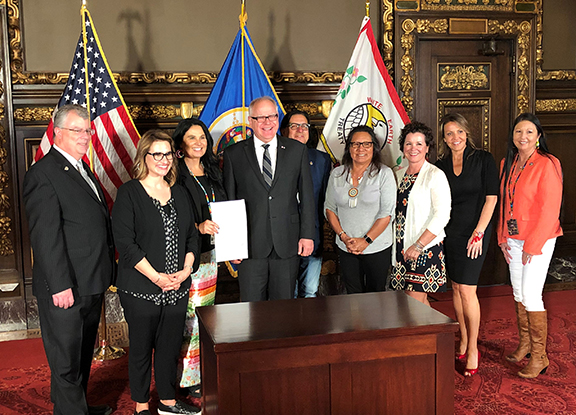
By Lee Egerstrom
A large number of bills sought by Native American groups and tribal governments approved by the Minnesota Legislature is becoming law, including a unique cooperative arrangement for the Prairie Island Indian Community’s (PIIC), to enforce state criminal laws on tribal land.
The Minnesota Legislature adjourned in late May. Issues important to Native Americans ranged from public safety, Health and Human Services programs for families, children and murdered and missing women; education and transportation.
“This shows we had a seat at the table,” said Lt. Gov. Peggy Flanagan, a White Earth member and former suburban, west metro area state legislator.
In an interview with The Circle, Flanagan said many of the Native-focused bills before the Legislature enjoyed bipartisan support and were also advocated by Gov. Tim Walz and her.
The significance there is that Minnesota is the only state with split Republican and Democratic (DFL) majorities in the two legislative houses while Walz and Flanagan are DFLers. That makes the split similar to the divide in the federal government although Washington might envy the accomplishments here.
Reviewing the past session, Flanagan said the presence of a Native caucus in the Legislature – and its collaboration with other lawmakers of color – helped bring Native issues to statewide attention. The caucus members work “in partnership with others, both in urban and tribal settings.”
This lays the groundwork for going forward, she said. “We don’t want this to be a flash in the pan.”
An example was the special Prairie Island bill changing existing law that required county approval for tribal policy to enforce state laws on tribal land. Yet to be determined is whether the Prairie Island law, while specific to PIIC, will apply to other tribal jurisdictions of whether similar legislative action may be needed in the future.
But this much is clear: The bill had overwhelming bipartisan support moving through the Legislature, passing the House on a 122 to eight vote, and the Senate by 58-7. The bill in the House was carried by Rep. Mary Kunesh-Podein, a DFLer who represents suburban north metro areas and is a member of the Standing Rock Sioux Tribe, and Republican Rep. Barb Haley, from neighboring Red Wing. The Senate bill’s lead sponsor was Sen. Michael Goggin, also a Republican from Red Wing.
At a ceremonial bill signing, Prairie Island Tribal Council President Shelley Buck said the change to an outdated law is what “respectful government-to-government relations is all about.”
In thanking the lawmakers and the Walz-Flanagan administration, Buck said, “There is a spirit of cooperation and commitment to improved Tribal-state relations that we haven’t seen in a long time.”
Buck also noted that Prairie Island has strong, respectful working relations with surrounding Goodhue County and neighboring police departments. “This change in the law is about fairness and respecting Tribal governments for what we are, governments,” she said. “It eliminates the risk that our ability to maintain safety on our land is diminished unilaterally or unfairly,” while setting precedence for what other tribal entities in Minnesota and across the nation might do.
Flanagan said the good relations between Prairie Island and neighbors is significant in the law’s passage, but a tribe’s ability to preserve the safety of its members and visitors by enforcing state laws is never guaranteed. Sheriffs and neighboring county officials are elected term-to-term and harmonious relationships are never certain over time.
Walz and Flanagan have issued a fact sheet on other issues important to Native Minnesotans handled in the past session of the Legislature. High among them is a first in the nation Missing and Murdered Indigenous Women Task Force to analyze causes for the number of missing and murdered Native women in Minnesota. What is known is that murder is the third leading cause of death for American Indian and Alaskan native women.
The approved state budget also provided $2 million in grants to support cultural and community support for color and Indigenous communities to promote early childhood and family health initiatives; and $16 million for tribal and county social services agencies where out-of-home placement of children is tied to parental drug abuse.
“Some of the tribes are running these programs by themselves, not by the counties,” Flanagan said. “We have the highest out-of-home placement rates in Minnesotan than any state in the nation.”
The budget also increases by $5 million for suicide prevention programs. It also establishes within the Department of Health and Human Services an American Indian Early Intervention Program to help Native families on reservations and in urban areas access culturally appropriate early intervention programs.
A similar program will have the state reimburse counties and tribes for child protection costs related to the opioid crisis that is especially severe among Native communities. It also provides grants to tribal governments to expand traditional healing, and it funds a special agent to coordinate investigations with tribal nations to disrupt opioid traffic into reservations.
Within the Education budget, $3.4 million of additional funds were set aside for American Indian Tribal Schools to equalize funding with the state’s general education formula.
Flanagan said there are four such Bureau of Indian Affairs schools, at the Leech Lake, White Earth, Mille Lacs and Fond du Lac Reservations. While funds have been provided in the past, it was one-time deals, she said. What the schools didn’t know was whether the money would come year to year.
Another Education budget item was $3.1 million in increased funding to recruit and retail teachers of color and $3 million to create mentoring, induction and retention incentive grants for teachers of color and American Indian teachers. Only 4.3 percent of Minnesota teachers are Indigenous and people of color while 33 percent of students are from these minorities.
The Department of Transportation budget, meanwhile, expands a government-to-government Tribal-State Relations Training program within the department and with other state agencies.
The one area of Native American interests that fell through the cracks in the late budget maneuvering was additional funds for remodeling and repairing the Minneapolis American Indian Center. Mary LaGarde, executive director, said MAIC had requested $2.6 million for the $15.2 million planned project.
“It didn’t make it,” she said. “We will go back (next year).”
The fundraising effort has raised $5,961,000 in grants and pledges by late June.






